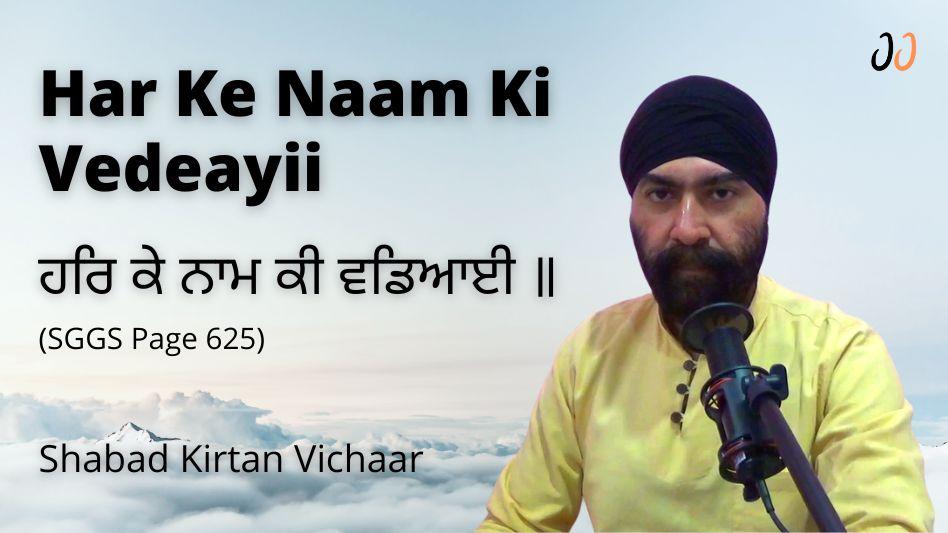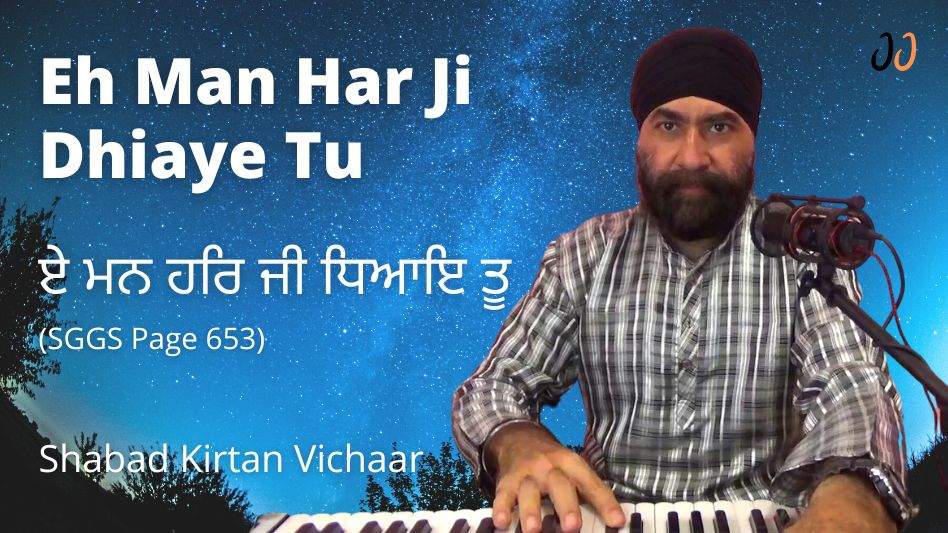Click Play button above to listen or you can read below.
This shabad is composed by Guru Amar Das Ji (3rd Sikh Guru). It is composed in Raag Bilawal and you will find this shabad in Sri Guru Granth Sahib (SGGS) pages 797 and 798.
Basically, this shabad is divided into four (4) parts with one ‘Rahao’ part.
Before I go into the explanation of the shabad, I’d like to clear one misconception.
What is the correct meaning of ‘Rahao’?
Actually, the meaning of Rahao ਰਹਾਉ has been misconstrued.
Most English Gurbani translations and phone apps state that Rahao means “pause”. Rahao does NOT mean “pause” or “pause and contemplate”.
The gist of the whole shabad is within the Rahao lines. It is the Rahao which sets the stage of contexual understanding of what the message within the shabad is conveying. It gives the central idea. Every line in the shabad needs to be read with a pause and contemplation. No one line or stanza or part within a shabad, has more weight or importance. All parts in a shabad are equally important. Just like a puzzle, it takes all parts to fit perfectly and only then the puzzle is considered complete. Same goes with every shabad.
But how about some shabads that do not have a Rahao part? Some only have a Pauri. So in this case, the pauri acts like a Rahao and sets the central idea of the shabad.
So, lets take a look at the Rahao lines for this shabad:
ਸਤਿਗੁਰ ਕੀ ਜਿਸ ਨੋ ਮਤਿ ਆਵੈ ਸੋ ਸਤਿਗੁਰ ਮਾਹਿ ਸਮਾਨਾ ॥
ਇਹ ਬਾਣੀ ਜੋ ਜੀਅਹੁ ਜਾਣੈ ਤਿਸੁ ਅੰਤਰਿ ਰਵੈ ਹਰਿ ਨਾਮਾ ॥੧॥ ਰਹਾਉ ॥
Satgur Ki Jisnu Matt Aawey, So Satgur Mahe Semana ||
Eh Bani Jo Jioh Jaaney, Tis Antar Rewei Har Nama || Rahao ||
This is truly unique what Guru Sahib wants us Sikhs to attain. Guru Ji says, IF anyone who has acquired the same matt or wisdom ( way of thinking) of the Guru, he or she is considered having acquired “divine wisdom”, and that person is considered absorbed within the teachings of the Guru. Absorbed in ‘har nama’ (divine knowledge/ divine wisdom).
In the first part of the shabad, Guru Ji says…
ਪੂਰਾ ਥਾਟੁ ਬਣਾਇਆ ਪੂਰੈ ਵੇਖਹੁ ਏਕ ਸਮਾਨਾ ॥
ਇਸੁ ਪਰਪੰਚ ਮਹਿ ਸਾਚੇ ਨਾਮ ਕੀ ਵਡਿਆਈ ਮਤੁ ਕੋ ਧਰਹੁ ਗੁਮਾਨਾ ॥੧॥
Poora Thaat Benaiya Poorey, Vekho Ek Samana ||
Is Parpanch Meh, Sachey Naam Ki Vedeaayii, Mat Ko Thero Gumana ||1||
The perfect Creator has created a perfect creation. There is no less or no more. The whole world and beyond every creature, every living thing, is made to perfection. Take for example the human body. Scientist are fathomed by the million neurons that power the mind, and what keeps the heart pumping and are not able to define why the heart would suddenly stop beating.
Guru Ji says, see the creation and the creator as one (vekho ek samana). If there is one thing we must do is amplify the Creator’s greatness which is ‘divine knowledge, divine wisdom (sachey naam ki vedeaayii).
But we cannot accept the greatness of the Creator if we do not renounce our ego. This is the barrier within that will prevent us from attaining true happiness and bliss. It will make us blind to the vast greatness of the Creator.
In the next part Guru Ji says…
ਚਹੁ ਜੁਗਾ ਕਾ ਹੁਣਿ ਨਿਬੇੜਾ ਨਰ ਮਨੁਖਾ ਨੋ ਏਕੁ ਨਿਧਾਨਾ ॥
ਜਤੁ ਸੰਜਮ ਤੀਰਥ ਓਨਾ ਜੁਗਾ ਕਾ ਧਰਮੁ ਹੈ ਕਲਿ ਮਹਿ ਕੀਰਤਿ ਹਰਿ ਨਾਮਾ ॥੨॥
Chho Juga Ka Hun Nebera, Nar Manukha Nu Ek Nedhana ||
Jat, Sanjam, Tirath, Una Juga Ka Dharam Hai, Kal Meh Keerat Har Nama ||2||
Taking the example of the mythological belief of the 4 timespans or ages (Chho Juga Ka – Sat Jug, Duapar, Treta and Kal Jug), Guru Ji says these ‘jugs’ are actually being lived by us humans at all times. Gurmat does not believe in the mythological timespan of the four ‘jugs’ or four ages.
Guru Sahib has taken this as an example to expel the wrong idea that there used to be such a timespan or that now we are all living in ‘Kal jug’ (the age of darkness). According to Gurmat, mankind lives the four jugs at every moment of their lives.
For example, when we lie and speak falsehood, we are living in ‘Kal Jug’ in that moment, but when our feelings and mind is pulled towards kindness and good deeds, we are living in ‘Sat Jug’.
In India and most of parts of the world, even until today, a vast number of people still believe in the mythological timespans or ages but not Gurmat. Guru Sahib says, this gift of ‘divine knowledge’ has been given to mankind (Nar Manukha Nu Ek Nedhana).
Further elaborating on the points of the timespans, people tend to believe during the time of Sat Jug, one is considered religious if one keeps to ‘fasts’ and religious rituals, in ‘Threta Jug’ one is considered religious if one adheres to self-control, tolerance.
During ‘Duapar Jug’ one is religious if one goes for pilgrimages and bathes in religious pools ‘sarovars’.
But in ‘Kal Jug’, Guru Ji says, one is religious when one lives according to ‘divine principles’ and sings (not literal), meaning accepts and lives by the Creator’s divine principles (Kal Meh Keerat Har Nama).
In the next part Guru Sahib says…
ਜੁਗਿ ਜੁਗਿ ਆਪੋ ਆਪਣਾ ਧਰਮੁ ਹੈ ਸੋਧਿ ਦੇਖਹੁ ਬੇਦ ਪੁਰਾਨਾ ॥
ਗੁਰਮੁਖਿ ਜਿਨੀ ਧਿਆਇਆ ਹਰਿ ਹਰਿ ਜਗਿ ਤੇ ਪੂਰੇ ਪਰਵਾਨਾ ॥੩॥
Jug Jug Aapo Aapna Dharam Hai, Sodh Dekho Bedh Purana ||
Gurmukh Jinni Theayiaa Har Har, Jag Te Purey Parvana ||3||
Referring to the various religious text (bedhs and Puranas), Guru Ji says, they have each made their own conclusions and assumptions about the Creator and ‘Jugs’ but truthfully, those who have contemplated on the divine teachings of the Guru – who live of divine principles – (Gurmukh Jinni Theayiaa), only they are considered accepted in whole (Purey Parvana). Only they live contented and fulfilled lives in this world.
In the last part Guru Ji says…
ਕਹਤ ਨਾਨਕੁ ਸਚੇ ਸਿਉ ਪ੍ਰੀਤਿ ਲਾਏ ਚੂਕੈ ਮਨਿ ਅਭਿਮਾਨਾ ॥
ਕਹਤ ਸੁਣਤ ਸਭੇ ਸੁਖ ਪਾਵਹਿ ਮਾਨਤ ਪਾਹਿ ਨਿਧਾਨਾ ॥੪॥੪॥
Kehet Nanak Sachey Sio Preet Laye, Chuukey Man Abhemana ||
Kehet Sunet Sabhey Sukh Paveh, Manat Pahey Nidhana ||4||4||
One is able to achieve true fulfillment when one makes an attempt to truly love the teachings and divine wisdom of the Creator.
With the help of the Guru (divine knowledgeand wisdom), one is able to eradicate ego and self-pride. And all true happiness and bliss comes to that person who believes truly from his or her heart. They are the ones who will receive the treasure of ‘divine virtues’ (Manat Pahey Nidhana).
Personal thoughts
We need to elevate our thinking beyond fables and mythological stories told to us by the clergy and truly understand the Creators treasure which is ‘Naam’ (divine principles).
The treasure of ‘Naam’ has been given to us (to all of mankind). Naam is the most exalted treasures of all. We need to stop believing in rituals and austerities and start working on eradicating our egos and self-pride in order to have a truly fulfilled and blissful life. This is what Gurbani and Gurmat of Sri Guru Granth Sahib Ji wishes to impart.
Anyone and just anyone, regardless of their caste, creed and religion is able to achieve this state of bliss which Guru Sahib talks about.
Afterall, aren’t we all chasing after the same thing? To have a peaceful and blissful life?



